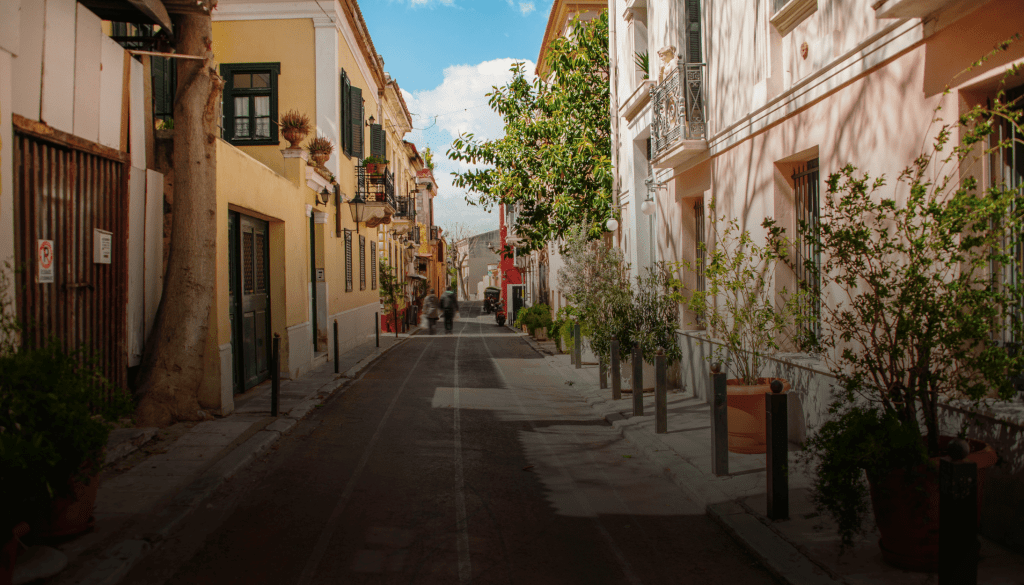Finding the Best Places to Live: Greece or Spain?
12 August 2024 – Tags International Money Transfers, Moving Overseas, Getting Best Rates

When considering a move to a Mediterranean paradise, it’s easy to be overwhelmed by choices. Greece, Spain, and Portugal are all ideal destinations, but if you are particularly torn between Greece or Spain to live, you’re not alone. These countries offer incredible historical legacies, beautiful landscapes, and distinct ways of life. Whether you’re relocating for work, retirement, or simply a new adventure, both Greece and Spain have their advantages.
This guide will provide an in-depth look at what makes these two Mediterranean countries so appealing, offering comparisons to Portugal along the way. We’ll cover all the essential aspects like cost of living, quality of life, climate, lifestyle, and healthcare—helping you make the best decision for your next chapter.
Why Consider Greece or Spain for Your Next Move?
Both Greece and Spain boast rich histories, Mediterranean climates, and charming lifestyles that attract expats from around the world. However, the experience of living in each is distinct. For example, Spain offers a vibrant, cosmopolitan culture with a diverse landscape ranging from bustling cities to peaceful rural areas, while Greece is famed for its ancient sites, beautiful islands, and relaxed pace of life. Let’s explore these countries in more detail to help you choose the best fit for your new home.
Greece: The Cradle of Civilisation

1. Rich History and Culture
Greece is a living museum. Known as the birthplace of democracy and philosophy, it has profoundly shaped Western civilization. Moving to Greece means living among ancient ruins, such as the Acropolis in Athens, the Temple of Apollo at Delphi, and the Palace of Knossos on Crete. Ancient history is woven into the fabric of modern Greek life, with festivals, music, and traditional dances celebrating this rich heritage.
Living in Greece is like stepping back in time, where the past mingles seamlessly with the present. You can explore ruins, dine at tavernas, and experience modern Greek culture, which places a strong emphasis on family and community.
2. Cost of Living
Compared to other European countries, the cost of living in Greece can be quite affordable, especially in rural areas or on smaller islands. However, the cost can increase significantly in larger cities like Athens and Thessaloniki.
- Rent: A one-bedroom apartment in Athens will cost between €400 and €700 per month, while rents in smaller towns can be as low as €300. The islands also offer lower rents, but prime areas like Mykonos and Santorini may have higher-than-average costs.
- Dining: Eating out is inexpensive in Greece, with a meal at a local tavern or restaurant averaging around €10 per person. If you cook at home, you can expect to spend between €200 and €300 on groceries for the month.
- Utilities: Monthly utilities (electricity, water, heating, garbage) can range from €100 to €150 depending on the size of your property.
3. Climate
The climate is one of the biggest draws of Greece. The country enjoys a Mediterranean climate with warm, dry summers and mild, wet winters. Coastal areas, including the islands, experience more moderate winter temperatures than inland regions. If you’re someone who thrives in the sun, Greece‘s 300 days of sunshine a year will make you feel right at home.
4. Lifestyle and Leisure
One of the best things about living in Greece is the relaxed pace of life. Whether you’re spending the day in Athens exploring ancient ruins, relaxing by the Aegean Sea, or enjoying a leisurely meal with friends, Greece is known for its easygoing, laid-back vibe.
Outdoor enthusiasts will find plenty to do, from hiking and sailing to island hopping. Traditional Greek cuisine is another highlight—savor fresh seafood, local olives, feta cheese, and the famous Mediterranean diet.
5. Healthcare and Education
Greece has a public healthcare system, which is affordable, though many expats prefer private healthcare for faster services. The quality of care varies, but for those willing to pay for private treatment, the services are excellent.
Education in Greece is primarily in Greek, but international schools with English-speaking curricula are available in major cities like Athens and Thessaloniki.
Spain: A Lively and Diverse Country

1. Vibrant Culture and Festivals
One of the first things that come to mind when thinking of Spain is its rich culture and world-famous festivals. From the excitement of La Tomatina to the passion of flamenco dancing in Seville, Spain is a country of celebration and tradition. Each region has its own customs, festivals, and unique cuisine. In Barcelona, you’ll find cutting-edge modernist architecture, while in the Andalusian region, you can enjoy historic Moorish palaces.
Living in Spain means experiencing a dynamic cultural life, rich in history, music, art, and food. From lively cities to quieter villages, Spain offers a range of experiences.
2. Cost of Living
The cost of living in Spain is generally moderate. However, cities like Madrid, Barcelona, and Bilbao are more expensive compared to smaller towns and rural areas. Spain’s overall affordability, however, still makes it an attractive destination for many.
- Rent: In cities like Madrid or Barcelona, expect to pay between €800 and €1,200 for a one-bedroom apartment in the city center. Smaller cities like Seville or Valencia are more affordable, with rents ranging from €500 to €700.
- Dining: Eating out in Spain is slightly more expensive than in Greece, with meals in inexpensive restaurants costing about €12.
- Groceries: Monthly grocery costs range from €250 to €350, depending on your lifestyle.
3. Climate
The climate in Spain is incredibly diverse. The coastal areas enjoy a typical Mediterranean climate, while the interior experiences more extreme temperatures, with hot summers and cold winters. The Canary Islands enjoy a subtropical climate, offering warm weather year-round. Spain‘s sunny weather, especially along the coast, is one of the biggest draws for expats.
4. Lifestyle and Leisure
Spain is famous for its laid-back lifestyle and vibrant social scene. The siesta—an afternoon break for relaxation or a nap—is still widely observed, especially in smaller towns and villages. The work-life balance in Spain is generally considered better than in many other European countries, allowing for plenty of time to enjoy outdoor activities, social gatherings, and family time.
With beaches, mountains, and vineyards, Spain offers plenty of opportunities for outdoor pursuits. Cities like Madrid and Barcelona are hubs for world-class entertainment, dining, and nightlife.
5. Healthcare and Education
Spain’s healthcare system is ranked among the best in Europe, offering both public and private options. Many expats prefer private healthcare for its efficiency and shorter waiting times.
Education in Spain is provided through public schools, private institutions, and international schools. The public system follows the Spanish curriculum, while international schools offer education in English or other languages.
Portugal: A Rising Star in Europe
Although this article primarily compares Greece or Spain to live, Portugal deserves mention as it continues to grow in popularity among expats. Offering a lower cost of living and an equally stunning landscape, Portugal is a prime choice for those looking to enjoy life in the sun on a budget.

1. Cultural Heritage and Modern Charm
Portugal’s maritime history and traditions are still very much alive, especially in cities like Lisbon and Porto, which blend old-world charm with modern amenities. Portuguese culture is rich in music, with Fado music being one of the country’s most iconic features. Festivals and celebrations occur year-round, from the colorful Festa de São João to the traditional Carnaval.
2. Cost of Living
Portugal is often considered more affordable than both Greece and Spain, especially in terms of housing. However, Lisbon and Porto can be pricey compared to rural areas.
- Rent: Rent in Lisbon typically ranges from €600 to €1,000 per month for a one-bedroom apartment. In smaller cities like Coimbra or Braga, rents can range from €400 to €600.
- Dining: A meal at an inexpensive restaurant will cost around €10.
- Groceries: Monthly grocery bills generally range from €200 to €300.
3. Climate
Portugal shares a Mediterranean climate, with sunny summers and mild winters, especially in the Algarve region. The weather is perfect for beach lovers, retirees, and those seeking a slower pace of life in the sun.
4. Lifestyle and Leisure
Portugal is often described as having a “slow living” atmosphere, with a focus on family, food, and relaxation. The country’s beaches, wine regions, and hiking trails offer endless opportunities for outdoor fun.
5. Healthcare and Education
Portugal has a well-regarded public healthcare system, with private healthcare options also available. Education in Portugal includes both public and private schools, and international schools in major cities cater to expats.
Comparing Cost of Living: Greece vs. Spain vs. Portugal
To help with your decision between Greece or Spain to live, here’s a more detailed breakdown
of typical expenses:
| Expense Category | Greece (€) | Spain (€) | Portugal (€) |
|---|---|---|---|
| Rent (1-bedroom) | 400-700 (Athens) | 800-1,200 (Madrid) | 600-1,000 (Lisbon) |
| Groceries (monthly) | 200-300 | 250-350 | 200-300 |
| Dining (inexpensive) | 10 | 12 | 10 |
| Utilities (monthly) | 100-150 | 120-180 | 100-150 |
| Internet (monthly) | 25-40 | 30-45 | 25-40 |
Safety: Greece, Spain, or Portugal?
- Greece: Greece is a safe country to live in, with crime rates relatively low compared to other European nations. Petty theft may occur in tourist hotspots, but violent crime is rare.
- Spain: Spain has a similar safety record, with urban areas experiencing more pickpocketing incidents, especially in crowded tourist locations.
- Portugal: Known for being one of the safest countries in Europe, Portugal consistently ranks highly in safety indices.
Final Thoughts: Greece or Spain to Live?
Choosing between Greece or Spain to live will largely depend on your lifestyle preferences. Greece is ideal for those seeking a more laid-back, historically rich environment with scenic beauty and excellent weather. Spain, on the other hand, offers a dynamic cultural experience, with diverse landscapes and activities for every type of expat.
Both countries offer an unparalleled quality of life, but ultimately, it comes down to your personal tastes, needs, and budget. For those looking for an affordable, slower pace of life, Greece and Portugal may be the better choice, whereas those who thrive in lively environments and urban energy may find Spain a better fit.
Are You Thinking of Making a Move to Greece or Spain to Live?
Making the decision to relocate to a new country is a big step, and Greece or Spain are both fantastic choices with their stunning landscapes, rich histories, and welcoming cultures. Whether you’re looking to retire on a sunny beach in the Mediterranean or start a new adventure in a vibrant city, these countries offer a unique lifestyle that’s hard to beat.

However, as exciting as the move may be, there are practical considerations to keep in mind—one of the most important being how to manage your finances during the transition. Converting your money to the local currency, managing large financial transfers, and understanding exchange rates can be daunting.
That’s where we come in. At Cambridge Currencies, we have years of experience helping expats like you get the best exchange rates when moving to Greece or Spain. Our expert currency specialists provide personalized guidance to ensure that your money goes further, whether you’re buying property, paying bills, or simply managing everyday expenses in your new home.
So, why not make your move easier and more cost-effective by speaking to one of our experienced currency experts? With our transparent, low-fee service and competitive rates, we’ll help you navigate the financial side of your relocation smoothly—so you can focus on what truly matters: starting your new life in Greece or Spain.
